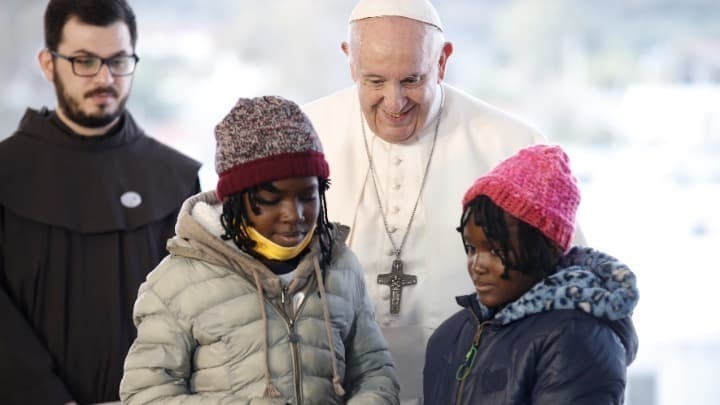In a powerful message that alluded to the death of a three-year-old refugee boy in 2015, Pope Francis criticized the prejudice of countries that refused to take in migrants and the inadequate policies of the European Union to deal with the migration issue in a humanitarian way.
Speaking from the Greek island of Lesvos, where he visited migrants at the Kara Tepe/Mavrovouni Reception and Identification Center, the head of the Catholic Church said that in the five years since his last visit to the island (April 2016) with Ecumenical Patriarch Bartholomew and the head of the Greek Orthodox Church in Greece Ieronymos "little has changed on the migration issue."
Despite the efforts by volunteers and the commitment to funding, as well as the efforts of the island's population, "this country, as well as others, are in difficult straits and in Europe there are people who insist on seeing the problem as an issue that does not concern them," the pope said.
"The respect of humans and human rights - especially on the continent that does not cease promoting them in the world - should be always protected, and each one's dignity should be placed above all. It is sad to hear suggesting the allocation of common funds to build walls as a solution," he said.
Pope Francis quoted Bartholomew's words to migrants and refugees to say "whoever is afraid of you has not looked you in the eyes, or seen your faces" and those of writer Elie Wiesel from his Nobel acceptance speech, "When human lives are endangered, when human dignity is in jeopardy, national borders and sensitivities become irrelevant."
Addressing himself to the refugees of Catholic faith listening to his speech, he said that he prayed to God "to shake us out of our self-centeredness", and he called on every human being to "overcome the paralysis of fear, the indifference that kills, the cynical indifference that with velvet gloves condemns to death anyone on the margins. Let us clash radically with the prevailing thought, that which revolves around the personal ego, around personal and national self-centeredness, which become a measure and criterion for everything."
It is self-deception to believe that it is enough to save ourselves, the pope said, by believing were are defending ourselves from those who are weaker and knocking on our doors. "History, and I repeat this, teaches us, but we have not yet learned [that] unilateral actions are not enough to turn toward doing good - we need policies of great breadth." Pope Francis said the migration and refugee issue "is a global issue, a humanitarian crisis that relates to all of us." The coronavirus pandemic crisis linked people to the migration crisis "by making us feel we are all in the same boat, by making us feel what it means to have the same fears," which must be faced in common, instead of implementing fragmentary solutions.
"But while vaccinations are being promoted on a global level with a lot of effort, and although something appears to be moving despite the multiple delays and uncertainties in the struggle for climate changes, everything points at a terrible shirking of justice in whatever relates to migration. Yet this is about human beings, human lives. This is about everyone's future, which will be peaceful only if everyone is included," the pope noted.
Addressing himself to political leaders and the peoples of Europe, the religious and political leader reminded them that migrants and refugees "are victims of emergency humanitarian needs which they did not create themselves, but they suffered them, frequently after long-term histories of abuses that continue. It is so easy to sway public opinion, spreading fear of the other. Yet, why is the same communication not used to speak about the taking advantage of the poor, the forgotten and often secretly funded wars, the economic agreements signed at the expense of human beings, the secret handling of weapons distribution, and the spread of the [drug] trade? It is the ultimate causes that must be dealt with, not the poor people who pay for the consequences and who are used for political propaganda." He added that managing emergency needs, coordinating actions and "approaching the change in times with great visions" are called for to resolve this complicated issue.
Pope Francis said it was necessary and brace to look at children in the face and be ashamed of what future has been prepared for them. "Let us not rush to forget the raw images of those tiny bodies lying immovable on beaches," he said, referring to the image that shocked the world of Alan Kurdi, 3, whose body washed ashore in Turkey in 2015.
"The Mediterranean, which for thousands of years has linked different peoples and distant countries, has become a cold cemetery without signs. This great repository and cradle of so many civilizations today looks like a mirror of death. Let us not allow our sea to turn into a sea of dead, this meeting space become a theater of clashes," the pope underlined.
In conclusion, he said that "at the shores of this sea, God became human" and taught humans they are all children of God. Faith requires compassion and charity. "Jesus formally confirms that he is there, with the stranger, the refugee, the naked, and the hungry. And the Christian plan is to be there, where Jesus is," Pope Francis said.

